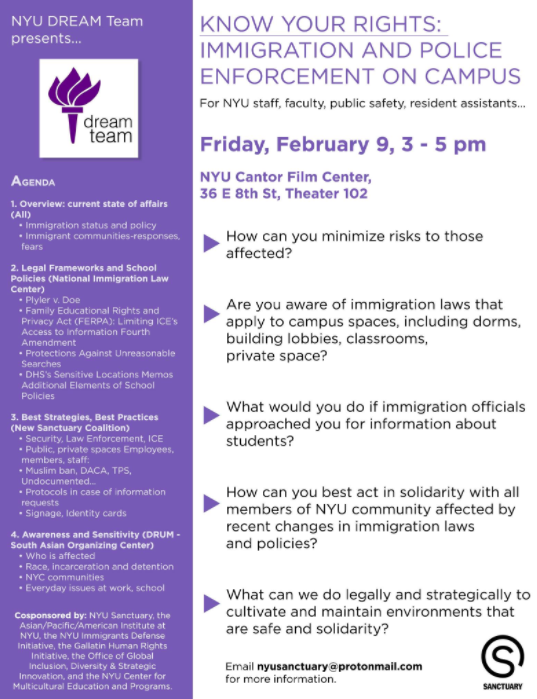Activists, Professors and NYU Organizations Host ‘Know Your Rights’ Immigration Workshop
A panel at Cantor Film Center came together to discuss immigration enforcement in the United States.
With notebooks out and pens at the ready, an audience of students and professors looked on diligently as professors, activists and NYU organizations conducted a workshop on immigrant rights in the Cantor Film Center.
February 10, 2018
A panel of activists, advocates and lawyers spoke yesterday at the Cantor Film Center about issues surrounding undocumented immigration status and immigration enforcement in the United States. The “Know Your Rights: Immigration & Police Enforcement on Campus” workshop was presented by the NYU Dream Team and cosponsored by NYU Sanctuary; the NYU Office of Global Inclusion, Diversity and Strategic Innovation; and a number of other university organizations and initiatives.
Speakers at the event served to both demystify the concept of immigration enforcement and present audience members with advice and strategies on how to minimize the threat of detainment against themselves and others.
“It is not a crime to be out of status, it’s a civil violation,” said Geoff Trenchard, an immigration attorney who spoke at the event. “It’s like a parking ticket; it’s why you’re not presented with a lawyer in immigration court.”
Trenchard spoke at length about recent efforts by both the White House and U.S. Immigration and Customs Enforcement to criminalize undocumented status.
“[ICE] are the ones creating most of the problems they claim to solve,” Trenchard said in his presentation.
Jackie Vimo, a policy analyst for the National Immigration Law Center, presented a number of steps to prevent interaction with ICE and how to behave if any meeting with immigration enforcement does occur.
Vimo explained that the difference between ICE agents and regular police officers is an important distinction as each have somewhat different jurisdictions and authorities. According to Vimo, a warrant from ICE does not carry the same authority as a judicial warrant, and she warned audience members to be wary of ICE agents seeking to detain individuals without having the proper authorization to do so.
But far before an interaction with ICE occurs, Vimo outlined ways of minimizing any eventual risk of detainment or threat to undocumented individuals. Schools, for instance, should limit the recording of any student information that may need to be turned over to ICE and consequently jeopardize a student’s safety.
“If there’s not a reason to be collecting information, don’t,” Vimo said. She added that institutions of higher learning can protect students by distinguishing between areas of campus that are closed or open — areas where students may or may not be protected from possible interaction with ICE.
Paula Chakravartty, a Steinhardt and Gallatin associate professor, and one of the organizers of the event said hosting the workshop was pertinent given the precariousness faced by individuals with undocumented status.
“The idea is to have immigrants’ rights activists and immigrants themselves communicate what their rights are because the laws are changing quickly,” Chakravartty said. “There’s a sense that there’s a need for this kind of education.”
Trenchard ended his presentation with a quote by Abraham Joshua Heschel, “In a free society, some are guilty but all are responsible.”
“[In 2018] there’s no one coming to help,” Trenchard said. “It’s on us.”
The event preceded a planned demonstration Feb. 11 at 26 Federal Plaza in support of Ravi Ragbir, executive director of the New Sanctuary Coalition of New York City — an immigrants rights group — currently detained by ICE.
Email Kyle Borowski at [email protected].
























































































































































